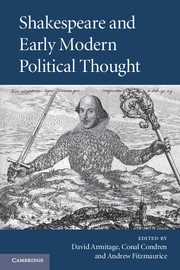Afterword: Shakespeare and humanist culture
Published online by Cambridge University Press: 18 January 2010
Summary
Although this volume includes chapters by a number of distinguished literary critics, most of the contributors are better known as students of the history of philosophy, and in particular of the history of political thought. According to the canons of post-modernism, this blurring of disciplinary boundaries ought not to cause the least anxiety, and ought indeed to be welcomed. After all, we are urged to recognise, students of philosophy no less than of literature – and indeed of music and painting too – are all concerned with the interrogation and appraisal of texts.
Despite such reassurances, it is hard not to feel that life is somewhat more complicated. Students of philosophy typically operate with the assumption that the propositions contained in the texts they analyse can also be treated as statements of belief. This is not to deny that philosophical works may often be suffused with obliqueness in the form of irony, parody and other hidden literary codes. It is simply to claim that, if our aim is to identify and elucidate the specific arguments being put forward in such works, it will be best to begin by assuming that their authors meant what they said and said what they meant. This seems a virtually inescapable principle of interpretation in the case of philosophical texts and is undoubtedly one reason it has proved so difficult for historians of philosophy to endorse without reservation the idea of the death of the author. It would be extremely unwise, however, to make any comparable assumptions about Shakespeare's texts.
- Type
- Chapter
- Information
- Shakespeare and Early Modern Political Thought , pp. 271 - 281Publisher: Cambridge University PressPrint publication year: 2009
- 3
- Cited by

